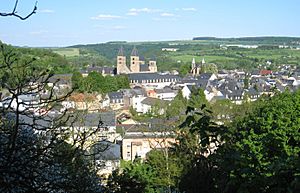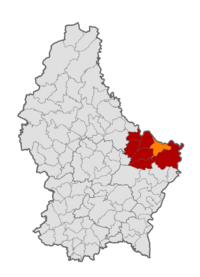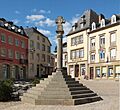Echternach facts for kids
Quick facts for kids
Echternach
Iechternach (Luxembourgish)
|
||
|---|---|---|
|
Commune
|
||
 |
||
|
||

Map of Luxembourg with Echternach highlighted in orange, and the canton in dark red
|
||
| Country | ||
| Canton | Echternach | |
| Area | ||
| • Total | 113.36 km2 (43.77 sq mi) | |
| Area rank | 1st of 100 | |
| Highest elevation | 393 m (1,289 ft) | |
| • Rank | 56th of 100 | |
| Lowest elevation | 154 m (505 ft) | |
| • Rank | 9th of 100 | |
| Population
(1 January 2019)
|
||
| • Total | 5,618 | |
| • Rank | 25th of 100 | |
| • Density | 49.559/km2 (128.357/sq mi) | |
| • Density rank | 20th of 100 | |
| Time zone | UTC+1 (CET) | |
| • Summer (DST) | UTC+2 (CEST) | |
| LAU 2 | LU0001005 | |
Echternach is a historic town in eastern Luxembourg. It is located near the border with Germany. Echternach is known as the oldest town in Luxembourg. It is part of the Echternach canton.
Contents
History of Echternach
The town of Echternach grew up around the Abbey of Echternach. This abbey was started in 698 by St Willibrord. He was an English monk from what is now northern England. St Willibrord became the first bishop of Utrecht and helped spread Christianity. He was the abbey's leader until he died in 739.
Every year, a special event called the Dancing procession of Echternach takes place. It happens on Whit Tuesday to honor St Willibrord.
The Sauer river flows past Echternach. Today, it forms the border between Luxembourg and Germany. Long ago, in Roman times, this river was not a border. A large Roman villa was found in Echternach in 1975. It was one of the biggest Roman villas north of the Alps.
Echternach was later given to St Willibrord by a Frankish princess named Irmina. Other lands were given to the Abbey by King Pepin the Short. The abbey also received support from the family of Charlemagne.
Even though the original abbey buildings burned down in 1017, a new Romanesque church was built. This church still stands today. St Willibrord's tomb is in its crypt. The abbey was famous for its library and for making beautiful handwritten books.
As the abbey became more important, the town of Echternach grew around it. The town was officially recognized as a city in 1236. The abbey was rebuilt in a fancy Baroque style in 1737.
During the French Revolution in 1794, the church was damaged. The abbey was used as a porcelain factory. In 1797, the monks were sent away, and the abbey's books were sold. Some of these old books, like the famous Echternach Gospels, are now in a library in Paris.
In the 1800s, the town faced hard times. But when the railroad arrived, it brought new life and many tourists.
During World War II, Echternach was badly damaged. This happened during the Battle of the Bulge in December 1944. However, the town was carefully rebuilt and restored after the war.
Culture and Landmarks
Echternach has two main churches. The biggest one is the Basilica of St Willibrord. This church is part of the original abbey. It is a great example of old Romano-Gothic building style. It is in the center of the town's old area. The abbey buildings around it are now a high school.
The other church is the parish church of St Peter and Paul. The remains of St Willibrord are also said to be under its altar. Close by, the Prehistory Museum shows the history of humans over the last million years.
Population
Gallery
Notable People from Echternach

Many interesting people have connections to Echternach:
- Johannes Holler (1614–1671) – A Roman Catholic bishop.
- Joseph-Alexandre Müller (1854–1931) – A Luxembourg composer who wrote music.
- Artur Sirk (1900–1937) – An Estonian political and military figure.
- Léon-Henri Roth (1922–1945) – A person who fought in the resistance during World War II.
- Jules A. Hoffmann (born 1941) – A French biologist. He won the Nobel Prize in Physiology or Medicine in 2011 for his work on how our bodies fight off sickness.
- Jeannette Goergen-Philip (born 1947) – An archer from Luxembourg. She competed in the 1984 and 1992 Summer Olympics.
- Gaston Stronck (born 1957) – A diplomat from Luxembourg.
- Georges Lentz (born 1965) – A composer from Luxembourg who grew up in Echternach.
Politicians from Echternach
- Caspar Mathias Spoo (1837–1914) – An industrialist and politician from Luxembourg.
- Robert Schaffner (1905–1979) – A Luxembourg politician who was mayor of Echternach twice.
- Marie-Josée Frank (born 1952) – A politician from Luxembourg.
- Marcel Sauber (born 1939) – A politician from Luxembourg.
- Fernand Boden (born 1943) – A politician from Luxembourg who served as a government minister for many years.
See also
 In Spanish: Echternach para niños
In Spanish: Echternach para niños
 | Ernest Everett Just |
 | Mary Jackson |
 | Emmett Chappelle |
 | Marie Maynard Daly |









